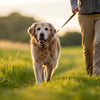How to Help an Old Dog Gain Weight: A Comprehensive Guide for Pet Owners
- Houndsy
Table of Contents
- Introduction
- The Importance of Monitoring Weight in Senior Dogs
- Nutritional Strategies for Weight Gain
- Lifestyle Adjustments to Support Weight Gain
- Conclusion
- FAQ
Introduction
Have you noticed your beloved senior dog becoming a bit thinner over time? You're not alone in this concern. According to recent studies, nearly 59% of dogs are classified as overweight or obese, but many pet owners overlook the signs when their older dogs start losing weight. It can be distressing to see our furry companions struggle with weight loss, especially when they seem to be eating normally. The reality is that weight loss in older dogs can stem from a variety of causes, ranging from natural aging processes to underlying health issues that require attention.
In this blog post, we're going to delve into the critical aspects of how to help an old dog gain weight. We’ll explore the potential causes of weight loss, effective dietary strategies, and lifestyle adjustments that can promote healthy weight gain. By the end of this guide, you’ll be equipped with the knowledge to tackle this issue and improve your dog’s well-being. So, let’s embark on this journey together, ensuring our furry friends enjoy their golden years full of health and happiness.
The Importance of Monitoring Weight in Senior Dogs
Understanding Weight Loss in Older Dogs
As our dogs age, their metabolism and body composition change, making them more susceptible to losing weight. Weight loss can occur gradually, often going unnoticed until significant changes happen. It is crucial to recognize that weight loss in older dogs can be symptomatic of various health issues. Veterinary professionals recommend that if your dog loses 10% or more of their normal weight, a thorough checkup is essential. This proactive approach is vital to ensure their continued health and quality of life.
Common Causes of Weight Loss in Older Dogs
Several factors can contribute to weight loss in senior dogs, including:
- Dental Issues: Painful teeth or gum disease can make eating uncomfortable, leading to reduced food intake.
- Medication Side Effects: Certain medications can suppress appetite or cause gastrointestinal discomfort.
- Underlying Health Conditions: Conditions such as kidney disease, diabetes, cancer, or thyroid issues can lead to weight loss.
- Digestive Disorders: Malabsorption disorders can prevent dogs from effectively utilizing the nutrients in their food.
- Decreased Activity Levels: Reduced physical activity can alter calorie requirements and lead to muscle loss.
Understanding these causes can help us identify the right approach to aid our dogs in gaining weight.
Nutritional Strategies for Weight Gain
1. Choose a High-Quality Dog Food
When it comes to helping an old dog gain weight, the foundation of their diet is crucial. Opt for high-quality dog food that is rich in calories and protein. Look for options that list meat as the primary ingredient and are specifically formulated for senior dogs. Foods with a higher fat content can also help in increasing calorie intake without requiring larger portion sizes.
Recommended Ingredients:
- Animal Proteins: Chicken, beef, fish, and eggs are excellent protein sources.
- Healthy Fats: Ingredients like fish oil, chicken fat, and flaxseed oil promote healthy weight gain.
2. Implement a Feeding Schedule
Adjusting your dog's feeding schedule can significantly impact their weight. Here are a couple of strategies to consider:
- Frequent Small Meals: Instead of two large meals, try offering three to four smaller meals throughout the day. This approach can help with nutrient absorption and make it easier for your dog to consume the calories they need.
- Evening Feeds: Consider giving your dog a larger meal in the evening. This aligns with the theory that eating before bedtime encourages the body to store calories instead of burning them.
3. Enhance Food Palatability
Older dogs can be picky eaters, especially if they have dental issues or reduced senses of taste and smell. Here are some ways to make their meals more appealing:
- Mix in Wet Food: Combining dry kibble with wet food can enhance flavor and increase moisture content, making it easier for your dog to eat.
- Food Toppers: Adding healthy toppers like pumpkin or sweet potato can improve taste and provide additional calories.
- Fresh Foods: Incorporating fresh, human-grade ingredients like lean meats or vegetables can stimulate appetite and provide essential nutrients.
4. Nutritional Supplements
Consider discussing nutritional supplements with your veterinarian. These can include:
- High-Calorie Supplements: Products designed to increase caloric intake without significantly increasing portion sizes.
- Probiotics: These can support gut health and enhance nutrient absorption, particularly in dogs with digestive issues.
Lifestyle Adjustments to Support Weight Gain
1. Regular Veterinary Checkups
Routine veterinary visits are essential for monitoring your dog's health, especially as they age. Your vet can help identify any underlying health issues that may be contributing to weight loss and recommend appropriate dietary adjustments.
2. Monitor Activity Levels
While exercise is important, the focus for a senior dog should be on maintaining muscle mass rather than losing weight. Engage in gentle activities such as:
- Short Walks: Keep walks light and short, adjusting the pace to suit your dog’s energy levels.
- Low-Impact Exercises: Activities like swimming can be beneficial, providing exercise without straining their joints.
3. Stress Management
Stress can lead to decreased appetite in dogs. To create a calming environment, consider:
- Routine: Establishing a consistent daily routine can help reduce anxiety.
- Safe Spaces: Providing cozy, quiet areas for resting can make your dog feel secure.
Conclusion
Helping an old dog gain weight requires a comprehensive approach that encompasses nutrition, lifestyle adjustments, and regular veterinary care. By understanding the underlying causes of weight loss and implementing effective strategies, we can ensure that our senior dogs enjoy their golden years in good health. Remember, every dog is unique, and what works for one may not work for another. Always consult with your veterinarian before making significant changes to your pet’s diet or routine.
If you're looking for an innovative solution to simplify the feeding process, we invite you to explore our Houndsy Kibble Dispenser. This sleek, ergonomic design not only helps manage portion control but also elevates the feeding experience, making mealtimes a breeze for both you and your furry friend.
FAQ
What should I do if my dog is losing weight but seems to have a normal appetite?
It’s essential to consult your veterinarian to rule out any underlying health problems. They can perform a thorough examination and recommend dietary changes if necessary.
How can I tell if my dog is underweight?
If you can see your dog’s ribs and spine prominently without a layer of fat, they may be underweight. A veterinarian can provide an accurate assessment using a Body Condition Score.
Is wet food better than dry food for gaining weight?
Wet food can be more palatable and easier for some dogs to eat, especially those with dental issues. Combining both wet and dry food may offer balanced nutrition and encourage weight gain.
How can I increase my dog’s appetite?
Enhancing the flavor and palatability of their food, providing a routine feeding schedule, and ensuring a stress-free environment can all help boost appetite.
What are some high-calorie foods I can give my dog?
Look for dog food formulated for weight gain that includes high-quality protein and healthy fats. Foods like sweet potatoes, canned pumpkin, and lean meats can also be good options.
By following these guidelines and maintaining close communication with your vet, we can help our senior dogs regain their weight and enjoy a vibrant, healthy life.












